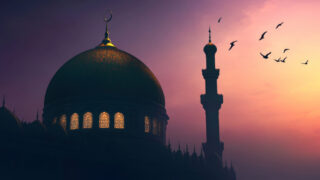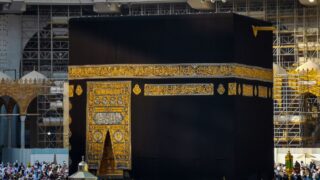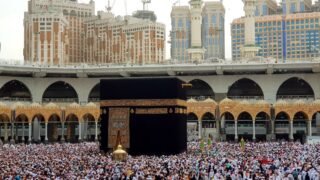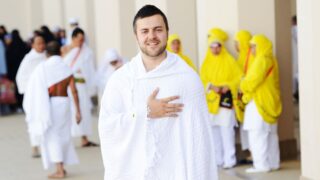{Safa and Marwah are among the symbols set up by God. Whoever visits the Sacred House for pilgrimage or `Umrah, would do no wrong to walk to and fro between them. He who does good of his own accord shall find that God is most thankful, All-Knowing.} (Al-Baqarah 2:158)
Several reports suggest a specific cause for the revelation of this verse; the most logical account, which is also the closest to the way of thinking Islam had cultivated in the minds of the early Muslims, is the following:
Walking between the two small hills known as Safa and Marwah had been part of the pilgrimage rituals practiced by the Arabs before Islam. However, two idols, Isaf and Na’ilah, were erected on top of them, respectively. Hence, some Muslims felt uneasy about this walk because of the two idols that had been there, associating the two hills with polytheism.
Al-Bukhari relates that, in answer to a question about walking between Safa and Marwah, Anas, a Companion of the Prophet, said:
“We used to consider them part of pre-Islamic ignorant tradition. With the advent of Islam, people stopped walking there as part of religious ritual. God then revealed the verse starting: {Safa and Marwah are among the symbols set up by God.} (Al-Baqarah 2:158)
Al-Shabi says: “Isaf was placed on Safa and Na’ilah on the Marwah, and people used to revere these idols. Hence, after Islam they felt uneasy about walking in between the two hills. Hence this verse was revealed.” No specific date can be determined for the revelation of this verse, but it seems more probable that it was revealed later than the verses dealing with the change of the direction of prayer. Although Makkah was hostile territory for the Muslims for many years after their migration to Madinah, it was possible for some of them to visit it for pilgrimage or Umrah. It is most probably such individual Muslim pilgrims who were reluctant to include Safa and Marwah in their rituals.
Their reluctance was the outcome of the long and rigorous process of education and purification they had undergone under their new faith. They developed a new sense of faith and religious understanding that made them question all the traditions and practices they had inherited from their pre-Islamic life, in case these were not sanctioned by Islam.
Islam shook the hearts of the Arabs who adopted it and penetrated the deepest recesses of their souls. It brought about a complete change in their psyche, perceptions and attitude. They began to view their pre-Islamic past with different eyes, and were inclined to divorce themselves from it completely. They no longer felt any affinity towards it; rather, it became a hateful legacy.
A closer study of that radical change brought about in the life of that generation by Islamic beliefs, principles and arguments would reveal how total and complete was the transformation they had undergone. It was as if the Prophet had shaken those people with an electric shock that reshaped their character and personality in a completely new form.
This is, in fact, the true essence of Islam: total departure from one’s previous jahiliyyah[1] convictions and outlook. One develops an acute sensitivity towards all that is un-Islamic, and all one’s inherited habits, customs, practices and traditions. Both heart and soul must be given up to the new religion.
Once that stage was reached in the life of that pioneering Muslim society, Islam began to adopt and reform those traditions and practices it considered acceptable and in line with its own principles, objectives and outlook. The Muslims then readopted those traditions and practices as part of Islam, and not because they had inherited them from their forefathers.
The incorporation of Safa and Marwah in the pilgrimage rituals is a good example of this process. Clarifying the issue, the Qur’an begins by stating:
{Safa and Marwah are among the symbols set up by God} (Al-Baqarah 2: 158)
When a person walks now from one to the other in the prescribed manner, he is fulfilling an Islamic ritual, devoted to God alone. It has been purified and cleansed of all its pagan associations and significance. Muslims can perform the ritual with no fear of doing anything wrong or un-Islamic.
{Whoever visits the Sacred House for pilgrimage or Umrah, would do no wrong to walk to and fro between them.} (Al-Baqarah 2:158) This was the case with most rituals of the pilgrimage practiced by the Arabs in pre-Islamic days. All aspects pertaining to idolatry were abolished. Now all the pilgrimage rituals have become linked to Islamic principles and restored to the original form practiced by Abraham (peace be upon him), as will be discussed in detail later in the Surah. In both Hajj andUmrah, walking between the two hills is a duty.
The verse ends with a statement praising voluntary acts of worship in general:
{He who does good of his own accord shall find that God is most thankful, All-Knowing.} (Al-Baqarah 2:158)
This statement affirms that God would welcome and appreciate such acts and would reserve generous rewards for their doers. By its very wording, this verse implies that walking between the two hills is a good action which earns reward from God.
The word shakir, which means “thankful”, used in the Arabic original to describe God’s response to voluntary acts, conveys a very friendly impression. It has the added connotation that God Almighty is very pleased with these acts and thanks His servants for doing them.
This would surely demand respect and modesty towards God on the part of His human servants. If God describes Himself as thankful to His servant for any good action that servant does, how can we be sufficiently grateful to God in our praise of Him? The connotations of divine compassion and mercy implied here defy description in human language.
By Sayyid Qutb

















